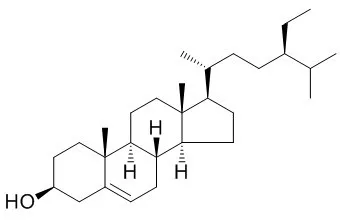| In vitro: |
| Biol Pharm Bull. 2007 Jul;30(7):1317-23. | | Beta-sitosterol induces anti-proliferation and apoptosis in human leukemic U937 cells through activation of caspase-3 and induction of Bax/Bcl-2 ratio.[Pubmed: 17603173] | Beta-Sitosterol is the main dietary phytosterol found in plants and has been shown to inhibit proliferation and induce apoptosis in human solid tumors such as colon and breast cancers. However, the mechanism by which Beta-Sitosterol induces apoptosis is not completely understood in leukemic cells.
METHODS AND RESULTS:
This study investigated the mechanism of apoptosis induced by Beta-Sitosterol in human leukemic U937 cells. Beta-Sitosterol induced cytotoxicity and apoptosis in U937 cells in a concentration dependent manner, as measured by hemocytometer counts, fluorescence microscopy, agarose gel electrophoresis, and flow cytometry analysis. The increase in apoptosis induced by Beta-Sitosterol was associated with down-regulation of Bcl-2, degradation of poly-(ADP-ribose) polymerase (PARP) and phospholipase C (PLC)-gamma1 protein, and activation of caspase-3. Beta-Sitosterol induced apoptosis was not associated with changes in the expression of Bcl-xL, Bax, or inhibitor of apoptosis proteins (IAPs). z-DEVD-fmk, a caspase-3 specific inhibitor, blocked caspase-3 activation and PARP degradation, and significantly attenuated Beta-Sitosterol-induced apoptosis. This suggests that caspase-3 activation is partially essential for Beta-Sitosterol-induced apoptosis. Bcl-2 overexpression also significantly blocked caspase-3 activation and the decrease in PARP cleavage by Beta-Sitosterol, and effectively attenuated the apoptotic response to Beta-Sitosterol.
CONCLUSIONS:
These results show that Beta-Sitosterol potently induces apoptosis in U937 cells and that Beta-Sitosterol-induced apoptosis is related to the selective activation of caspase-3 and induction of Bax/Bcl-2 ratio. | | Angiogenesis. 1999;3(2):117-23. | | A novel angiogenic factor derived from Aloe vera gel: beta-sitosterol, a plant sterol.[Pubmed: 14517429] | Aloe vera gel has a beneficial effect on wound healing. Because angiogenesis is an essential process in wound healing, we hypothesized that Aloe vera gel might contain potent angiogenic compounds.
METHODS AND RESULTS:
Here we demonstrate that Aloe vera gel and its extracts are angiogenic on the chorioallantoic membrane (CAM) of chick embryo. Out of the three compounds purified from the final fraction of Aloe vera gel, Beta-Sitosterol showed a potent angiogenic activity in the CAM assay. In the presence of heparin, Beta-Sitosterol stimulated neovascularization in the mouse Matrigel plug assay and the motility of human umbilical vein endothelial cells in an in vitro wound migration assay.
CONCLUSIONS:
Thus Beta-Sitosterol is a novel plant-derived angiogenic factor which may have potential pharmaceutical applications for the management of chronic wounds. | | Nutr Cancer . 2015;67(8):1214-20 | | Beta-Sitosterol: A Promising but Orphan Nutraceutical to Fight Against Cancer[Pubmed: 26473555] | | All the currently available cancer therapeutic options are expensive but none of them are safe. However, traditional plant-derived medicines or compounds are relatively safe. One widely known such compound is Beta-Sitosterol (BS), a plant derived nutrient with anticancer properties against breast cancer, prostate cancer, colon cancer, lung cancer, stomach cancer, ovarian cancer, and leukemia. Studies have shown that BS interfere with multiple cell signaling pathways, including cell cycle, apoptosis, proliferation, survival, invasion, angiogenesis, metastasis and inflammation. Most of the studies are incomplete partly due to the fact that BS is relatively less potent. But the fact that it is generally considered as nontoxic, the opposite of all currently available cancer chemo-therapeutics, is missed by almost all research communities. To offset the lower efficacy of BS, designing BS delivery for "cancer cell specific" therapy hold huge potential. Delivery of BS through liposome is one of such demonstrations that has shown to be highly promising. But further research did not progress neither in the field of drug delivery of BS nor in the field on how BS mediated anticancer activities could be improved, thus making BS an orphan nutraceutical. Therefore, extensive research with BS as potent anticancer nutraceutical is highly recommended. |
|
| In vivo: |
| Planta Med. 1980 Jun;39(2):157-63. | | Anti-inflammatory and antipyretic activities of beta-sitosterol[Reference: WebLink] |
METHODS AND RESULTS:
The anti-inflammatory and antipyretic activities of Beta-Sitosterol , isolated from the plant CYPERUS ROTUNDUS has been studied, employing carrageenin induced oedema, cotton pellet implantation and Brewer's yeast induced pyrexia in rats. Beta-Sitosterol was found to possess potent anti-inflammatory activity against both the tests, similar to hydrocortisone and oxyphenbutazone when administered intraperitoneally. Moreover, it was also orally effective against carrageenin induced oedema. The antiinflammatory activity of Beta-Sitosterol was independent of pituitary adrenal axis. Beta-Sitosterol also possessed antipyretic activity, similar to acetylsalicylic acid. However, it was devoid of analgesic activity against aconitine induced writhing in mice. Beta-Sitosterol showed a wide margin of safety since the approximate LD 50 was more than 3 g/kg i.p. in mice and minimum ulcerogenic dose was 600 mg/kg i.p. in rats.
CONCLUSIONS:
The presence of the anti-inflammatory and antipyretic activities with wide margin of safety, Beta-Sitosterol may be of therapeutic value. |
|






 Cell. 2018 Jan 11;172(1-2):249-261.e12. doi: 10.1016/j.cell.2017.12.019.IF=36.216(2019)
Cell. 2018 Jan 11;172(1-2):249-261.e12. doi: 10.1016/j.cell.2017.12.019.IF=36.216(2019) Cell Metab. 2020 Mar 3;31(3):534-548.e5. doi: 10.1016/j.cmet.2020.01.002.IF=22.415(2019)
Cell Metab. 2020 Mar 3;31(3):534-548.e5. doi: 10.1016/j.cmet.2020.01.002.IF=22.415(2019) Mol Cell. 2017 Nov 16;68(4):673-685.e6. doi: 10.1016/j.molcel.2017.10.022.IF=14.548(2019)
Mol Cell. 2017 Nov 16;68(4):673-685.e6. doi: 10.1016/j.molcel.2017.10.022.IF=14.548(2019)